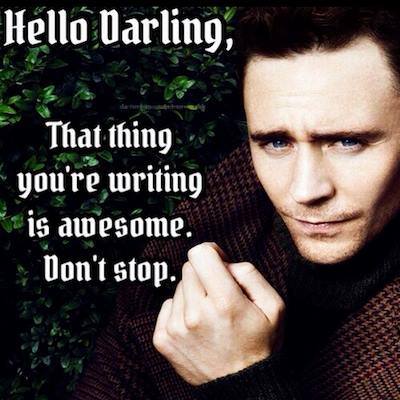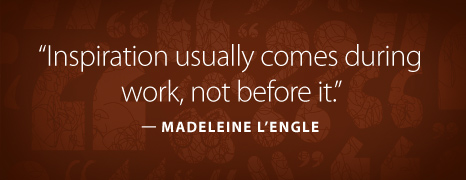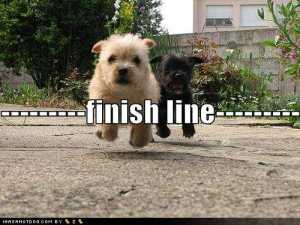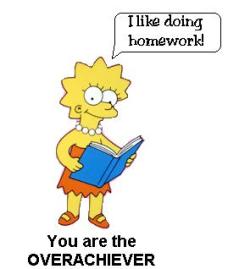It’s been nine months since I participated in National Novel Writing Month (NaNoWriMo) and wrote 50,000 words of a novel in under a month. It’s one thing to bask in the manic euphoria of pounding out 50,000 words like an intense sprint around a track. But it’s completely different thing to step back and look at what you’ve written and see if it’s worth anything. Yes, I braved reading my NaNoWriMo draft, and I’ve even begun to draft revisions. But what I’ve discovered in the post-NaNo-creation glow is pretty surprising…
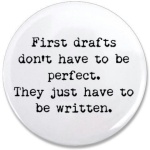
1) My First Draft Isn’t Shitty
First off, I’m not a fan of the term shitty first drafts. Yes, it was created to help us deal with our need for perfection in the first draft, but I also think it creates a cycle of negativity. The idea of telling ourselves our drafts are shitty, only reinforces the negative feelings we already fear about our work. Sure, a first draft may not be publishable, but honestly, I never think they’re shitty. However, if there was any instance where my theories on shitty first drafts would be overturned it would be NaNoWriMo … after all, I pumped out this draft in 2 ½ weeks. Only…
My NaNoWriMo Draft isn’t shitty!
Sure, it’s not polished gold, but there are so many important discoveries in it, explorations that led to new plot points, beautiful lines, sassy sections of dialogue, and even entire scenes that are good. Not scenes that are okay… but good!
My point is: we should trust our first drafts more. Trust the joy and the positive energy that can come from freeing yourself up and writing quickly. Trust the fact that you do know what you’re doing and your writing is better than you think it is!
 2) Revisions are Empowering
2) Revisions are Empowering
Okay, so my first draft isn’t complete crap, but there’s still plenty of work to do. The second great discovery about writing a quick first draft is that when you approach revisions you immediately know what to do to make the book better. Revisions don’t become nail-biting, hair-pulling, exercises in frustration. Instead, revision become empowering!
For me, it can be the despair, the sense that I don’t know what to do, that makes writing so hard. But revising this novel has been invigorating and fun. There’s power and purpose in sitting down with raw material and knowing exactly what to do to shape it. It helps me to see how much I already know about crafting good stories, and that I’m able to do it with intention.
 3) It Doesn’t Take as Long as I Think to Write a Novel
3) It Doesn’t Take as Long as I Think to Write a Novel
Looking back at my NaNoWriMo time sheets, I’ve discovered that I spent an average of 1½ hours writing per day. Yes, there were a few days where I put in 3 to 4 hours in a sitting. But mostly it was 1 ½ hours a day. As I’ve moved on to revision, I’ve also put in an average of 1 1/2 hours per day. By keeping a time sheet I’ve started to see how much I can accomplish in a short amount of time. In fact, I haven’t even put in a full month’s worth of work into this novel yet!
One of our big struggles with writing is finding the time to get it done. But I’ve been floored to discover how much I can accomplish with only 1 ½ hours a day! I bet most of you could find 1 or 2 hours in your day to write.
 4) Scenes That Went Nowhere…
4) Scenes That Went Nowhere…
Not every section of my NaNoWriMo draft works. But, I discoverd a pattern to the pages that fell flat or went nowhere. These scenes were searching for direction, and without it they floundered.
In my pre-planning stages I outlined and created scene-cards for the scenes I knew existed. I did, however, leave a few blank. I made the excuse that I’d figure it out later, while writing. It turns out that every scene I promised to figure out later on, didn’t go anywhere. Sometimes I’d know the general action of a scene, but the things that really killed my momentum were not knowing what my character wanted in the scene, or what his or her emotional change would be. All the scenes with a clear character goal and emotional change came alive on the page. Perhaps this is the through line I needed to guide me while writing really fast.
 5) Everything You Think You Know is Wrong! Or… Don’t Put On Writing Blinders.
5) Everything You Think You Know is Wrong! Or… Don’t Put On Writing Blinders.
I was certain that NaNoWriMo was going to be a huge failure. I had some snobby ideas about how a novel should be written. I was certain those participating in NaNoWriMo were wasting their time. But boy was I wrong. Wrong. Wrong. Wrong. Wrong. Wrong!
I don’t think I will write every novel in my future this way. But I do think it will be a great way to write some of them. But man, if I’d stayed in my stuffy singular way of looking at things, I would have never discovered this amazing tool and these important lessons.
So get out there and try new things with your writing. Try things you’re certain will not work. Allow yourself to fail. We never know what will work until we put it into practice and give it a whirl.
What Did You Learn from NaNoWriMo?
Did anyone else participate in NaNoWriMo this year? Have you re-read your work? Started revisions? What discoveries have you made?











